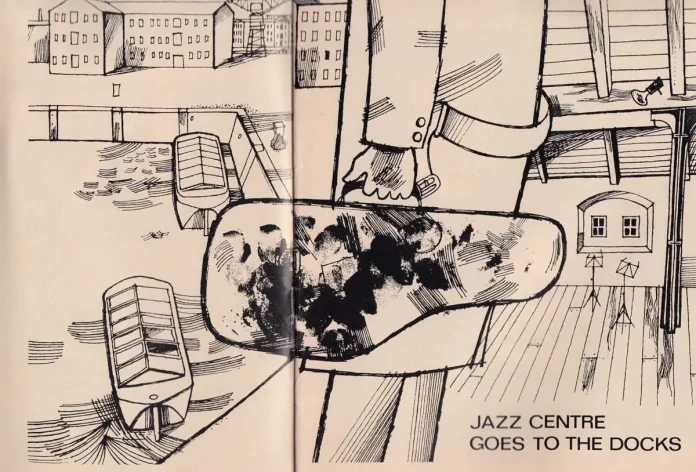
Once upon a time, a group of aficionados, irked by the fact that opportunities to see ‘The Ring’ and ‘Don Giovanni’ were severely circumscribed, decided to do something about it. They chose a site close to Covent Garden, and discarded evening wear could be seen among the sprouts and cabbages as they set to work. And in a little under thirty years, helped along by the occasional visits of a shirt-sleeved Bernard Levin, the Royal Opera House was there to commemorate their devotion to the cause of Art.
A distinct parallel, not to be taken too seriously, exists between the foregoing myth and the reality of the Jazz Centre Society’s recent activities. For while theatres spring up in the provinces and the Festival Hall shows no signs of closing its doors, the members of an organisation devoted to a music recognised by the Establishment as a Genuine Art Form have had to carve a home out of an old warehouse, their gang of volunteer labourers linked together by the thinnest of shoe-strings.
The Jazz Centre Society, a charity for the furtherance of jazz, its ultimate aim a permanent centre for the music, embodying facilities for concerts, tuition and rehearsal, and the headquarters of a library, information centre and advisory board, was formed in 1968. Since that time, the society have presented countless club sessions in London, a series of concerts each winter in the Conway Hall, London School of Economics and the Notre Dame Hall, have assisted jazz clubs in London, Gillingham, Rochester and other locations, and have sponsored several special events including concerts at the Mermaid Theatre and a programme of late night films and jazz at the National Film Theatre. The money has come from membership fees, benefit concerts and donations from individuals and organisations like the Performing Rights Society; the Musicians Union has given grants towards the payment of musician’s fees, and financial assistance for concerts has come from bodies like the Arts Council, the Southern Arts Association and the Merseyside Arts Association. In August last year, full-time administrators were appointed, and until overheads became too crippling, the society’s activities were concentrated on the Country Club at Hampstead, where concerts and club sessions were planned from the JCS office there.
Struggle has been the most significant factor in their history however, and this remained the case even after Taylor Woodrow provided a warehouse near the Royal Mint for five charities, JCS included, to use as a community centre. Without money to finance the operation adequately, the fight to turn one floor of a warehouse into a Jazz Centre has been a very hard one. Of course, the whole question of the subsidising of the arts, and to what particular channels any available resources should be diverted, is a very vexed one, and a solution to such a massive problem would probably involve an examination of the fundamentals of a society rather larger than the JCS; I found it hard though, during a recent visit to the work in progress, to suppress a feeling of anger that, although ‘officially’ regarded as being equal to those arts that are, to put it mildly, comfortably off, jazz has had to rely in this instance on super-enthusiastic amateur help racing against time to effect a conversion which a team of contractors with professional equipment would probably have looked on as a soft option.
But this piece is only partly a lament; it’s also a celebration of the fact that in spite of considerable vicissitudes, the Jazz Centre’s opening weekend will be in progress by the time this magazine reaches the bookstalls; this three-day festival featuring Alexis Korner, Mike Westbrook, Keith Tippett, the Lamb/Premru Orchestra and Alex Welsh, will be followed by the first of the record recitals which will be part of the new scene. There are, of course, goals yet to be achieved; regular club sessions can’t begin yet, but frequent concerts are planned, and before long it should be possible for you to visit the Centre, flick through a few copies of JJ in the library, have a quick game of jazz darts in the bar, and finish off the evening by digging your favourite brand of live jazz – all kinds will be presented. There’ll be a new way of jazz life down by the docks – hard-won, but worth waiting for.















